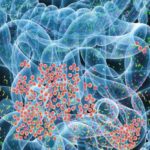by Chelsea Garcia, MEd Certified Exercise Physiologist
Your gut microbiome plays a very important role in your digestion, immune function, and risk of disease! It functions to protect, strengthen, and nourish our bodies by providing beneficial bacteria.
There are tens of trillions of micro-organisms in our gut and intestines that help break down the food we ingest. Everyone’s gut microbiome is made up of more than 3 million bacterial genes. The most populated areas are the jejunum in the small intestine, large intestine, and colon.
Why is the gut microbiome important? Recent studies have shown that the makeup of our gut microbiota could affect our risk of obesity or other metabolic diseases. Not everyone has the exact same types of bacteria, and there are a lot of things that influence a person’s microbiome. For example, the method of delivery at birth, breast feeding vs. formula, environment, and how much exercise or physical activity you do per day. All of these factors affect the composition of your microbiome. Although we may not be able to change how we were brought into this world or the environment we live in, one thing we CAN control is our physical activity levels and nutrition.
Exercising regularly is one of the best things you can do for your health and well being. Doing a combination of cardiovascular, resistance training and flexibility exercises can help change your gut microbiome. However, changing your diet will change your gut microbes in a different way than just exercising. Exercising has shown to help increase levels of short chain fatty acids which will promote a healthy gut and reduce inflammation. This is why doing both will give you the best outcome.
What is considered a “Good Microbiota?” There are the 3 P’s that your gut bug loves: PREbiotics, PRObiotics, and polyphenols. PREbiotics are the non-digestible fiber that comes from foods like garlic, bananas, onions, and asparagus. PREbiotics feed the PRObiotics. PRObiotics are live beneficial bacteria that are created through consuming fermented food like kimchi, sauerkraut, yogurt, kombucha. There are also PRObiotics that are already present in your gut. Polyphenols are found in your cruciferous veggies like cabbage, broccoli, cauliflower, kale, turnips, and brussels sprouts and often have anti-inflammatory properties.
Another interesting factor to consider is how gluten affects the gut. Recent studies have shown that when healthy individuals eat a gluten free diet their good bacteria levels decrease and pathogenic bacteria levels increase along with a decrease in immune function. Based on these results, it is suggested to leave gluten in the diet unless you are medically diagnosed with a gluten sensitivity or intolerance.
To get on the right track and make sure you are exercising and eating the right foods for your gut to flourish, give us a call at 310-582-8212 or email chelsea@phase-iv.net to set up a FREE Consultation.
Article Sources:
Wheat, Microbiome and Health: The Science Behind Gut Health and Food Intolerances
Corrie Whisner, PhD Assistant Professor of Nutrition Arizona State University
The Gut Microbiome in Health and in Disease
Andrew Shreiner; John Kao; Vincent Young







